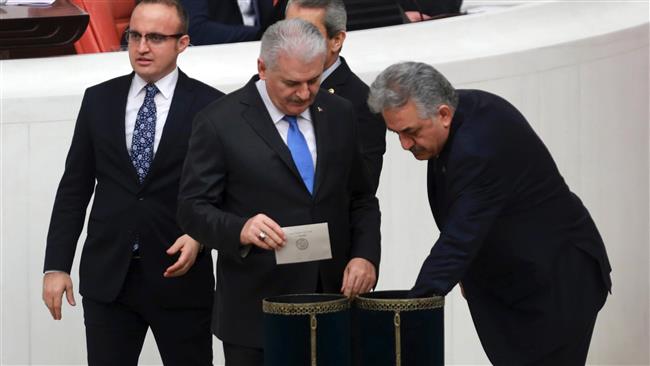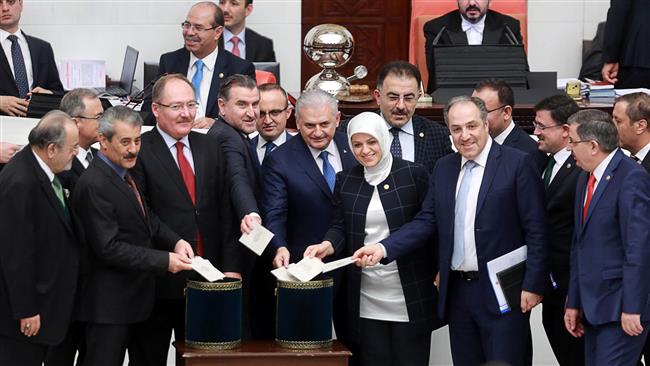Turkish bill leaves no place for checks on presidential powers: HRW
A Human Rights Watch official has expressed concern over parliamentary approval of a controversial package of constitutional reforms that would grant additional executive powers to the Turkish president, saying the new mechanism leaves no place for any check on presidential powers.
Emma Sinclair-Webb, Turkey director of New York-based rights group, said on Saturday that the new charter does not ensure strong checks and balances on the power despite the government's insistence.
“According to the Turkish model that is outlined in this amendment, you don't have any such check on presidential powers,” she pointed out.
Sinclair-Webb also feared that ordinary people would not be sufficiently informed about the implications of the constitutional amendments.
“There is no possibility under a state of emergency for an effective public debate in the media about the changes that are being brought in,” she said.
Earlier on Saturday, a total of 339 Turkish legislators voted for a constitutional reform bill with 142 against the changes.
The constitutional changes would allow Turkish President Recep Tayyip Erdogan to serve two five-year tenures in office, meaning he could be leading Turkey until 2029.
The new mechanism would also enable the president to appoint and dismiss government officials at his own discretion.
The president would further be able to be a party member, thus giving Erdogan a permit to return to the AKP leadership.
Meanwhile, President of the Union of Turkish Bar Associations (UTBA) Metin Feyzioglu also criticized the changes, saying they were reminiscent of the country's Ottoman history.

“This new system is not unknown to us, because we have been ruled for 600 years in this way. It has a name which is sultanate.”
“It is not a reform but suicide and the people will not commit suicide,” he added.
As part of the newly-approved reforms, the number of parliamentarians will be increased from 550 to 600, the minimum age to be a lawmaker will be lowered to 18 from 25, and parliamentary and presidential elections will be held together every five years.
The AKP and far-right Nationalist Movement Party (MHP) maintain that constitutional amendments will create a strong executive leadership contrary to the fragile coalition governments of the past.
Turkish opposition demands early vote after parliament vote
Meanwhile, the leader of Turkey’s main opposition Republican People's Party (CHP) has censured the approval of the constitutional changes, demanding that the government call an early election “if it is not afraid of the public will.”

Kemal Kilicdaroglu said there should be a vote, in which political parties can bring forward their own proposals for constitutional amendments before the AKP-drafted constitutional charter heads to a referendum, likely to be held in early April.
“In order for this constitutional amendment to be properly discussed in society and not imposed on society, election must be held first. We are saying ‘Hold an Election First,’ as they do not go to an election. They are the ones who are scared of the nation’s will,” he commented.

The CHP leader expressed confidence that the Turkish people will say ‘no’ in the referendum.
“If we destroy the common ground, we will only lay the ground for internal conflicts and disputes,” he added.
The Turkish legislature’s third biggest party, the Peoples’ Democratic Party (HDP), also opposes the constitutional reforms.
FM stresses Iranians’ resolve to defend sovereignty, security in face of foreign-backed interference
China bars domestic firms from using US, Israeli cybersecurity software: Report
VIDEO | Trump’s Greenland threats is about natural resources, standing up to Russia and China
VIDEO | Iran unity in foreign-backed riots
IRGC intelligence details successful confrontation against US-, Israeli-backed unrest drive
Hezbollah warns Lebanese government disarming group could trigger civil war
Israel legalizes five illegal settlements in West Bank, defying global outrage
IRGC warns of decisive response to miscalculations by US, Israel














 This makes it easy to access the Press TV website
This makes it easy to access the Press TV website